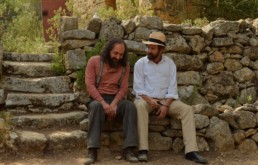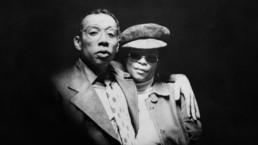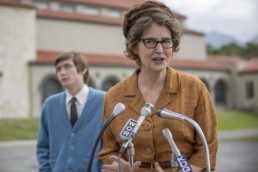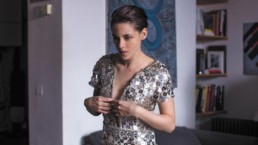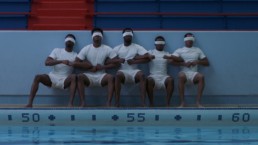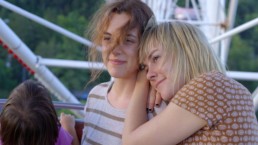'Cézanne Et Moi' Review: French Artists Face Friendship Rivalry
Directed by Danièle Thompson, Cézanne Et Moi tells a timeless story of friendship rivalry and bitterness although it, unfortunately, falls victim to historical stuffiness.
Hitting select theaters this Friday is the Parisian historical biography Cézanne Et Moi, a lengthy recounting of the true-life friendship between two artists in the late 1800s. Running just shy of two hours and subtitled in French, Cézanne Et Moi proves to be a rather arduous watch, despite its interesting context of 19th Century poets and painters.
Writer Émile Zola (Guillaume Canet) greets his friend, the titular French painter Paul Cézanne (Guillaume Gallienne) at his large estate in Médan, a northwestern suburb of Paris. The house compliments Zola's aesthetic, sharply dressed and beaming with wealth. Cézanne, on the other hand, looks about as rough as he feels– his shaggy hair and unkempt appearance symbolizing his struggles as a working painter. From here, the film moves very fast through flashbacks of their first meeting in grade school, to their mischevious twenties, and finally middle age. Just as their friendship evolves throughout the years, so do their individual successes and failures, ultimately driving a wedge between the two men who used to be best friends.
Directed by Danièle Thompson, Cézanne Et Moi tells a timeless story of friendship rivalry and bitterness although it, unfortunately, falls victim to historical stuffiness. Relying heavily on the performances from the lead actors, which are delivered with an abundance of verve and theatrics, and a dense script, including a lot of superfluous chit-chats, Cézanne is a tough film to sit through. This is not to be confused with calling it a bad movie; in fact, the images of Paris and those who lived there in the 1800s are extremely beautiful and give the film life.
For as grandiose as their accomplishments and notoriety, overall, 'Cézanne Et Moi' feels like it comes up a bit short in its retelling of their relationship.
Credit also belongs to the actors, who fully embody the men they set out to play. Canet as Émile Zola looks the part to a tee, stoic yet refined. Gallienne transforms physically and emotionally into the explosive artist Cézanne, wearing his emotions on his sleeve and confidently pursuing his passion despite the hardships he faced.
Considered some of the greatest figures in French culture, Cézanne was looked up to by Picasso and Matisse, who considered him "a god of painting." To this day, over 700 of his works are on display around the world. Zola is still considered the most prominent French novelist of the late 19th century and is credited as founding the Naturalist art movement. For as grandiose as their accomplishments and notoriety, overall, Cézanne Et Moi feels like it comes up a bit short in its retelling of their relationship.
'Cézanne Et Moi' is rated R for language, sexual references, and nudity. 117 minutes. Playing in select Laemmle theaters this Friday, 4/7.
'Colossal' Review: Try This as an Indie Alternative to the Studio Monster Movie
This Freaky Friday meets Godzilla flick isn't quite the comedy its trailer makes it out to be, rather, it is an unapologetically dark look at self-destruction, alcohol and relationship abuse, and bullying– all taking shape as a mythical kaiju creature.
Anne Hathaway knows what it's like to be bullied. The Best Supporting Actress winner (Les Misérables) is known for getting her fair share of flack from critics who deem her "strive for perfection" to be annoying, but she has never retaliated towards these haters by transforming into a giant killer monster on a mission to destroy. In Colossal, Hathaway plays Gloria, a woman whose experience with a childhood bully ultimately changed her in ways she never knew existed until she is forced to re-examine her life and face her frenemy twenty-five years later.
The sun peeks through the window of the NYC apartment Gloria (Hathaway) shares with her British boyfriend as she creeps in from a late night out. Hair disheveled and smelling of alcohol, her constant drinking and lying prove to be the last straw for her boyfriend Tim (Dan Stevens) as he kicks Gloria out, already having packed her bags for a swift exit. Finding solace in the familiar, she heads back to her childhood home in the suburbs. She begins to settle into life in the slow lane before running into her childhood friend Oscar (Jason Sudeikis). Despite her pledge to stay away from alcohol, she agrees to work at the local bar Oscar owns while doing her best to stay on the straight and narrow.
While Gloria battles her inner demons stateside, a gigantic monster has begun terrorizing the city of Seoul, South Korea. With seemingly no personal connection to this devastating event, Gloria, along with the rest of the world, looks on in horror as a green mega-monster, who appears and disappears into thin air, destroys buildings, landscapes, and kills anyone in its path. It isn't until a night alone when Gloria realizes that she is (literally) responsible for the mysterious creature's actions and is left to figure out, amidst multiple obstacles, how to save Seoul, her relationships, and herself.
Don't let the film's traditional first act fool you– while establishing that the character's world is based in reality, 'Colossal' slowly turns up the dial towards far-fetched fantasy...
Directed by Nacho Vigalondo, Colossal is an original story in the midst of reboots and remakes. It's one we've never seen before, bursting with creativity and surprises. Don't let the film's traditional first act fool you– while establishing that the character's world is based in reality, Colossal slowly turns up the dial towards far-fetched fantasy that, by the end of the film, is a complete 180-degree flip. This Freaky Friday meets Godzilla flick isn't quite the comedy its trailer suggests (despite a few laugh out loud moments), rather, it is an unapologetically dark look at self-destruction, alcohol, relationship abuse, and bullying– all taking shape as a mythical kaiju creature.
While the premise is enjoyable, despite being far-fetched, the same can't necessarily be said for the characters. Hathaway's Gloria is likable enough, tapping into every fear that a thirty-something-year-old woman who doesn't necessarily have her life together feels at one point or another. While she may not be sympathetic enough to feel sorry for, mostly because her issues are self-inflicted, we still root for her to succeed. Oscar, on the other hand, starts out as a well-intentioned friend who does everything he can to help Gloria in her time of need. From offering her a job to giving her furniture for her empty house, Oscar seems like the perfect guy to help turn Gloria's life around. That's why he seems almost bipolar when he demonstrates such unlikeable qualities about halfway through the film. For example, it's one thing to show off and assert male dominance around Gloria, but to punch her in the face until she falls to the ground is completely unsettling to see. It's definitely not funny and feels extremely uncomfortable. Oscar later blames his actions on alcohol, but nothing can erase that image from my memory.
General character development seems to be lacking in Colossal, which proves to be its biggest downfall. We don't ever see the buildup of Gloria's vices, only the consequences of her actions, which forces the audience to assume her behavior is a pattern without ever actually seeing the pattern. Because of this, it's also hard to distinguish when Gloria is drunk or sober (both performances seem about the same amount of spastic). Although, despite its shortcomings and critiques, Colossal is a nice indie alternative to the studio "monster movie" and could benefit those who want to escape reality for a couple of hours.
'Colossal' is rated R for language. 110 minutes. Opening at ArcLight Hollywood and The Landmark this Friday, 4/7.
'I Called Him Morgan' Review: The Dark Side of Jazz
Larry's audio of Helen's posthumous interview narrates the documentary, and it is every bit as intriguing and sobering as one would expect.
Ever since "La La Land" sang and danced its way into the heart of Hollywood last year, the interest in jazz music has been rising. I'll admit to creating multiple Spotify playlists to familiarize myself with the legendary musicians of a genre I had yet to fully discover. Although, I realized that after watching the documentary "I Called Him Morgan," the light and airy jazz scene image I had envisioned a lá "La La Land" is comparable to the Disney version of Jazz music. "I Called Him Morgan" shows the dark side of the soulful sound– from drugs and deceit to an untimely death.
February 20, 1972. Wunderkind trumpeter, Lee Morgan, was shot to death on a snowy night in a New York City jazz club. His death sent shockwaves throughout the music community for many reasons. First, there was his undeniable talent. Morgan was 16 years old when he first broke onto the scene and was held in high regard ever since. Second, was his age, which was only 33 at the time of his death. He had a lifetime of music ahead of him and many felt robbed of enjoying what was perceived as his future potential. But the most shocking reason of all was who the person responsible for killing him was– his common-law wife, Helen Morgan.
Helen was arrested on the spot and sentenced to time in prison. After her release, she enrolled in a local college where she met a western civilizations teacher, Larry Reni Thomas. A jazz enthusiast, Larry was determined to interview Helen while he still had the chance. In 1996, 20 years after her release from prison, she agreed to talk to Larry. One month later, Helen died. Larry's audio of Helen's posthumous interview narrates the documentary, and it is every bit as intriguing and sobering as one would expect.
While her actions were unforgivable, it is easy to sympathize with a woman who felt unloved.
Interviews with Lee's old bandmates, peers, and his mistress (the cause of Helen's deadly motivation) are sprinkled in throughout the film which proves just as eye opening as Helen's testimony. They speak to Lee's struggles with drugs and his career low, which happened to be the time when he met and became dependent on Helen, who was 14 years older than him. Their anecdotes give the film a fuller bodied narrative as opposed to just hearing one side of the story. Helen doesn't deny her guilt, in fact, she confesses, hoping it was all a terrible nightmare that she would wake up from, the moment after she shot Lee. Her personal struggles could only be conveyed in the first person, and that is why hearing her side of the story before her death is priceless. From conceiving her first child at 13 years old and her second at 14, to meeting Lee and dealing with his affair, her life was never easy. While her actions were unforgivable, it becomes easier to sympathize with a woman who felt unloved.
Directed by Kasper Collin ("My Name Is Albert Ayler") with cinematography by Oscar-nominated DP Bradford Young ("Selma," "Arrival"), "I Called Him Morgan" has made the rounds on the festival circuit, playing at TIFF, Venice, and NYFF. For those interested in learning more about the history of the Jazz community, or even for those familiar with Lee Morgan and just want to hear Helen's side of the story, this documentary is enthralling from start to finish.
"I Called Him Morgan" is not rated. 91 minutes. Now playing at Laemmle’s Monica Film Center and Laemmle’s Playhouse 7.
'The Most Hated Woman in America' Review: Melissa Leo is The Most Hated Woman in the Country
After this biopic, it is hopeful that one will take away a new understanding or, dare I say, sympathy, for the woman who singlehandedly changed America... for better or for worse.
A quick Google search of the phrase "the most hated woman in America" may bring up pictures of Casey Anthony, but it's anti-religious activist Madalyn Murray O'Hair that holds this unfortunate title in the Tommy O'Haver directed biopic, "The Most Hated Woman in America." O'Haver, whose directorial range spans from the drama "An American Crime" to the family film "Ella Enchanted," puts an engrossing spotlight on one of the strangest cases in American history.
O'Haver teams up with his long-time collaborator and writing partner, Irene Turner, to bring this true story to the big screen. The film begins on August 27, 1995, the first day of the O'Hair family's kidnapping. 77-year-old Madalyn Murray O'Hair, portrayed by an unrecognizable Melissa Leo, is an infamous crusader for atheism who definitely has more haters than supporters. Her circle of trust runs small– aside from her younger son, Garth (Michael Chernus), and granddaughter, Robin (Juno Temple), who have also been kidnapped– Madalyn has never been one to get sympathy from anyone, especially her older son Bill, Jr (Vincent Kartheiser). So when news of her disappearance begins to make the rounds, it is either dismissed or assumed to be a self-gratifying fundraising ploy for her organization, American Atheists.
However, despite her blacklisted reputation, journalist Jack Ferguson (Adam Scott) can't ignore this obvious case of kidnapping. Digging into Madalyn's past, and eventually teaming up with her estranged older son Bill Jr, Jack sets out to solve the unanswered questions and bring the woman considered to be the "Devil's Daughter" home.
She eventually founded the organization American Atheists, which undoubtedly received daily death threats, but even that did not stop her from continuing to be a pioneer and revolutionary of the First Amendment and religious freedom.
The film does a fantastic job when cutting back and forth between the kidnapping and Madalyn's upbringing in the 1950's. Even as a young mother, Madalyn was very unconventional and anti-religion. She was raising a son as a single mother, had a law degree but no job, and did not conform to the religious undertones of the times. Her first exercise in speaking her truth came during the march for equality in downtown Baltimore, as Madalyn and her young son Bill Jr. were the only white protestors. In 1963, Madalyn was the force behind the banning of prayer in public schools. She eventually founded the organization American Atheists, which undoubtedly received daily death threats, but even that did not stop her from continuing to be a pioneer and revolutionary of the First Amendment and religious freedom.
Melissa Leo sinks into the character of Madalyn, a performance only made stronger after watching the archival footage of the real Ms. O'Hair during the film's end credits. Leo's approach to embodying this strong-minded woman isn't alienating or off-putting, instead, she humanizes a famous figure who, up until this point, had only been seen as the devil. After this biopic, it is hopeful that one will take away a new understanding or, dare I say, sympathy, for the woman who singlehandedly changed America... for better or for worse.
'The Most Hated Woman in America' is not rated. 91 minutes. Now streaming on Netflix.
'Our Dream of Water' Short Doc Highlights Tragic Water Crisis
"The Wolfpack" director Crystal Moselle brings "Our Dream of Water," an effort to raise awareness about the global water crisis, to National Geographic today.
It's ironic that the minute I start watching this film, it begins to rain in Los Angeles. The slight drizzle is always a welcomed sight, especially with our growing drought, however, I can't help but feel guilty as I listen to the heartbreaking stories from three women who dedicate their lives to finding clean water for their family and community, only to be faced with daily roadblocks and hardships. For many of us, rain equals a free car wash, but for the people that face extreme droughts, rainwater is literally life-saving.
Director Crystal Moselle, the creative visionary behind "The Wolfpack," has teamed up with Stella Artois and National Geographic to create the documentary "Our Dream of Water" in an effort to raise awareness about the global water crisis. The film profiles three women from some of the most water-scarce countries on the planet: Haiti, Kenya, and Peru. Running just under an hour long, the film will debut on National Geographic today at 6:oo PST.
Being fortunate enough to have access to drinking water that is free of dirt, animal feces, and bacteria is a gift that we often take for granted. The Flint water crisis has brought much-needed attention to this global problem, but shockingly, millions of people face even more extreme conditions. In Peru, the single reservoir the town shares holds water that looks like hot chocolate due to the mud channels it drains from. In Kenya, 17 of 45 million people don't have access to clean water and have to rely on the dirty river for their survival. Haitians have resorted to scooping up buckets of water from gutters.
Being fortunate enough to have access to drinking water that is free of dirt, animal feces, and bacteria is a gift that we often take for granted.
At a time when we use excess water as a form of mindless entertainment, like offering a free Nintendo Wii to anyone who can drink the most water without using the restroom (which unfortunately resulted in one woman's death due to water intoxication), "Our Dream of Water" really opens our eyes to lives outside of our own and makes one think about how we can do our part to help those in need.
Cinematically, Moselle has the same respect for these women as she did with the Angulo siblings in "The Wolfpack," there is no sense of judgment or exploiting their shortcomings. We are purely observing their daily lives with beautiful sweeping montages of the dry, yet colorful environment and moving through the streets as fluidly as a running river.
Intentional or not, Moselle also broadens the impact of the film by reinforcing the power of women and their roles as not only family caretakers, but activists, doctors, and above all else, extremely hard workers. In all three countries, women have formed support groups that attempt to lift community spirits and take their mind off of water problems.
The strength and perseverance of these women are incredibly inspiring. Despite their circumstances and lack of basic necessities, they remain grateful for what they do have. Even the film ends on a positive note, that "No burden is too heavy with lots of hands put together."
Since the film's premiere, donations have already begun to help improve the situation in the three communities, allowing wells to be created and filters to be installed.
“Our Dream of Water” (commissioned by Stella Artois as a part of the “Buy A Lady A Drink” campaign, an ongoing partnership with Water.org) will debut on National Geographic at 6:00 p.m. EST/PST on March 22, on World Water Day, with an encore presentation on March 23 at 3:00 p.m. EST/PST and on demand through most large cable providers,natgeotv.com, and on the Nat Geo TV Everywhere platform (available on AppleTV, Roku, iOS phones and devices, Android phones, Xbox One & 360, Samsung Connected TVs).
'Personal Shopper' Review: Kristen Stewart Proves Herself as a True Tour de Force
Personal Shopper can best be summed up by the following film references: The Devil Wears Prada meets The Sixth Sense told through an art-house lens.
Next to her newly shaved head, Kristen Stewart’s indie film Personal Shopper is the latest buzz-worthy presentation coming from the multi-hyphenated actress/director/Chanel ambassador. Stewart fully breaks free from whatever vampire blockbuster chains she had left as she transforms into an emotionally complex and intriguing fashion stylist who dabbles in connecting with the spirit world in the hopes of finding closure from her twin brother's death. Unfortunately, even with her strength and vulnerability portrayed in full force, she still can’t quite overshadow the gaps and confusion stemming from a questionable script and tonal imbalance.
Stewart continues to uphold her indie darling status by reteaming with French director Olivier Assayas (see: 2014’s Clouds of Sils Maria) for this intimate psychological thriller. Here she plays Maureen, an American living in Paris as a personal shopper for a local celebrity, Kyra (Nora von Waldstätten). The glitz and the glamour of this high-fashion life do not faze her (at first), as Maureen throws herself into the position as well as the extracurricular activity of looking for a sign from her deceased brother. Both born with the same heart defect, the siblings made a pact that whoever passed first would send the other a sign. Maureen is now adamant that she cannot leave the city her brother died in until she is confident he has made his presence known to her.
At first, Maureen brushes off the text messages from an Unknown number as just a prank or even inappropriate cyberstalking. What she did not expect was to be followed (haunted, if you will) by a presence she could not see or feel. As she becomes consumed by her phone and the anticipation of the next text, Maureen begins to unravel at the seams. Exposing her vulnerabilities brought on by her phone, she is pushed out of her comfort zone by the unfamiliar messenger, and finally caves by acting out her wildest fantasies. Wearing Kyra’s forbidden clothes and sleeping in her bed while she’s out of town are just the tip of the iceberg. It is only when Maureen stumbles upon a murder that she is forced to take an introspective look at herself and face her demons, once and for all.
Essentially acting opposite herself, she commands the picture with a quiet strength that I would love to see more of.
The French filmmaker’s high fashion-meets-ghost story tale proves to be a divisive watch (despite winning the Best Director award the Cannes Film Festival, as well as a nomination for the prestigious Palme d’Or– the honor ended up going to the British film “I, Daniel Blake”). Visually, the film is a nice balance between glitzy and gritty, but leaving the superficiality of looks aside, Personal Shopper leaves much to be desired. It is one thing to engage an audience in staying actively attentive, but a “choose your own adventure” scenario, which is what I felt like Personal Shopper ended up being, did a disservice to the film. Numerous setups never paid off and genre-blending felt inconsistent as opposed to fluid. However, it is undeniable that Kristen Stewart is magnetic to watch onscreen. Essentially acting opposite herself, she commands the picture with a quiet strength that I would love to see more of.
Personal Shopper can best be summed up by the following film references: The Devil Wears Prada meets The Sixth Sense told through an arthouse lens. Yes, the story seems unbelievable at times, but despite its flaws, Kristen Stewart emerges out from under the weight of this somewhat confusing script as a shining beacon of cinematic vision.
'Personal Shopper' is rated R for some language, sexuality, nudity and a bloody violent image. 105 minutes. Now playing in select cities, including ArcLight Hollywood and the Landmark.
'Burning Sands' Review: Underground Hazing Is Seen Through a Different Lens
With help from the film's soundtrack, which includes tracks from J. Cole, Outkast, Future, and an original song from the film's executive producer Common, McMurray creates a world full of raw emotion, tension-filled relationships, and an alternative coming of age journey that we don't often see in film.
Another Netflix acquisition from the 2017 Sundance Film Festival is having its big debut on the streaming service this Friday and as its name would suggest, "Burning Sands" is a pretty brutal and boundary-pushing watch. The story rings similar to last year's "Goat" centered on fraternity hazing and the psychological undertaking that pledges are put through before they are finally "accepted" into the brotherhood. Yet we are given a new perspective in "Burning Sands" thanks to director Gerard McMurray, who sets the story in a historically black college.
"It's all about the brotherhood," Zurich (Trevor Jackson) says as a small group of pledges make their way to the first day of Hell Week for the Lamda Lamda Phi fraternity at Frederick Douglass University. It's early in the morning, but that doesn't stop the older brothers from kicking, screaming, and all around demeaning the young men as a test of their loyalty to the prestigious group. For Zurich, joining the fraternity would be more than just a personal victory; his father had rushed the same frat but dropped out because he couldn't make it through hell week.
Hell week, we come to find out, tests more than just the pledges' physical strength, but also their pain tolerance (they endure branding with metal rods), intellect (they must memorize the fraternities entire history), sexual ability (they have to sleep with a girl of the older brother's choosing), and all around endurance (early morning call times, military-grade exercises, etc). Fraternity hazing is, of course, illegal, so the group takes their torture underground, where rules don't exist.
Fraternity hazing is, of course, illegal, so the group takes their torture underground, where rules don't exist.
Now, why would anybody willingly endure not only the physical but verbal abuse from peers and older brothers (including Trevante Rhodes of "Moonlight") who are supposed to be your life-long friends? Initially, Zurich's longing for societal acceptance and his dad's pride drove him to continue, but as the darker side of the fraternity begins to affect his personal life and gnaw at his conscious, Zurich finds himself stuck at a crossroads– should he remain silent and continue to endure unjustifiable violence or should he stand up against what he knows is wrong?
"Burning Sands" is Gerard McMurray's directorial debut, although he is no stranger to gritty indie films. He served as an associate producer on the biographical drama "Fruitvale Station" and brings the same intensity to his project. With help from the film's soundtrack, which includes tracks from J. Cole, Outkast, Future, and an original song from the film's executive producer Common, McMurray creates a world full of raw emotion, tension-filled relationships, and an alternative coming of age journey that we don't often see in film. So while it may be a tough watch, it is an unforgettable one.
'Burning Sands' is not rated. 96 minutes. Available to watch on Netflix this Friday, March 10th.
'Lovesong' is a Beautiful Breath of Fresh Air
This review originally ran on August 15, 2016, during the Sundance NEXT Fest
What we have here is an intimate drama about life, love, and dealing with life's unpredictability.
After seeing "Lovesong" on the opening night of NEXT Fest, LA’s mini Sundance Film Festival, I now know why this little indie film has made the industry's "Best of" lists. What we have here is an intimate drama about life, love, and dealing with unpredictability. "Lovesong" is a film whose strength comes from the quiet moments and commanding performances of leading ladies Riley Keough and Jena Malone.
Keough plays Sarah, a woman essentially living as a single mother since the relationship she has with her husband exists solely through grainy Skype chats. He travels a lot for work, leaving her alone to care for their 3-year-old daughter Jessie (phenomenally played by tiny tot Jessie Ok Gray). The time apart clearly has taken its toll on Sarah, who puts on a happy face around her daughter, but is hiding a world of pain inside. She feels alive again when her longtime friend Mindy (Malone) comes to town to visit. Escaping the boredom of home, Sarah packs up her car with Jessie in tow and, with Mindy by her side, the girls set out on an impromptu road trip that leads to unexpected truths. A combination of vulnerability, isolation, and a game of "Truth or Drink" leads to Sarah and Mindy discovering feelings that neither one of them expected as the lines blur between loving each other as friends vs being in love with each other.
"Lovesong" doesn't have a stereotypical happy ending, but it doesn't have a sad one either. I am especially impressed by how unapologetically realistic this film is, giving the audience very little, if any, backstory to the characters or their relationships; we only know what they are telling us, giving us no other perspective than their own. The trust that director So Yong Kim puts in her actors to convey her story pays off tenfold. It almost feels like we are watching a really gripping reality television show (and I mean this is in a good way), with ordinary people just trying to figure out their lives. There is no melodrama, no flare or theatrics, just one substantially powerful and honest film.
There is no melodrama, no flare or theatrics, just one substantially powerful and honest film.
There is so much to love aside from just the screenplay. Riley Keough is having a fantastic year and this further proves that she is not just a lucky girl who used her famous family to get into show business, she is the real deal. She has the ability to tap into deep emotional states, and watching her on the screen can only be described as seeing pure talent. The same praise should be given to Jena Malone, whose warmth radiates from the screen to our hearts. A mesmerizing soundtrack scored by Icelandic composer Jóhann Jóhannson perfectly sets the mood, while singer-songwriter Shamir's RnB 90's poppy beat keeps the film light and airy.
Experiencing this intimate, personal growth through the character’s eyes makes "Lovesong" a true slice of life drama– despite the uncertainty of their future and anxiousness of the present moment, Sarah and Mindy are still able to find the beauty in simple moments. Not everything we want to happen in life will happen, and that's ok, as evident by our protagonists. We've just got to keep on keepin' on.
"Lovesong" is not rated. 84 minutes. Now playing at Laemmle Monica Film Center and Laemmle Playhouse 7.

